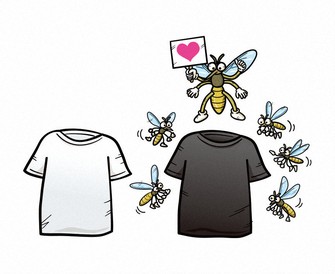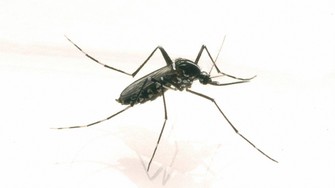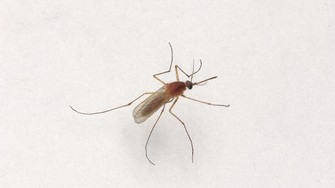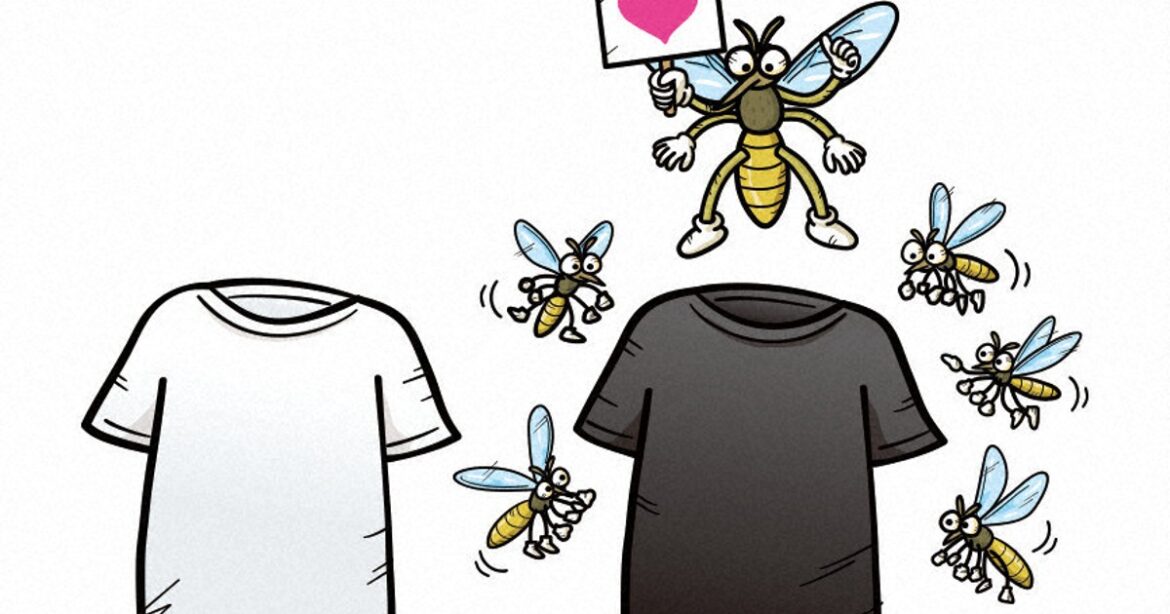
This illustration shows mosquitoes being attracted to a shirt in a darker shade. (Image courtesy of Dainihon Jochugiku Co.)
TOKYO — The sweltering summer is finally over in Japan, though it’s still a bit early to fully enjoy the cool evening breeze. In the meantime, experts warn that this time of year is actually peak mosquito season.
Many people are complaining about mosquito bites through social media posts, with comments like, “It’s time to break out the mosquito coils” and, “Autumn mosquitoes are vicious.” The Mainichi Shimbun asked an expert why mosquitoes become more aggressive in the fall and what individuals can do to protect themselves.
Mosquitoes hide in shade during extreme heat
“In recent years, fall has become the season with the most mosquitoes,” says Tomoko Kahara from the public relations office of Dainihon Jochugiku Co., a major insecticide company known for its Kincho brand. She is also an expert who has been involved in pest research at the company’s research institute for many years.

An Asian tiger mosquito. (Image courtesy of Dainihon Jochugiku Co.)
Mosquito populations begin to grow in the spring and the insects become most active when the temperature is around 27 degrees Celsius. When daytime temperatures soar well above 30 C, mosquitoes tend to hide and rest in shady areas or grassy spots.
Even though they may be out of sight, the mosquitoes continue to breed and multiply. Their population peaks by fall, when temperatures begin to drop, and they become active again. In recent years, the lingering summer heat has extended their period of activity.
Mosquitos bite to preserve species
According to Kahara, the two main mosquito species that bite people in Japan are the Asian tiger mosquito and the common house mosquito. The reason female mosquitoes bite and suck blood is to get the nutrients needed to lay eggs.
An adult mosquito lives for only about a month. From their perspective, the cooler weather finally allows them to move around during the day, so they are likely desperate for blood in order to reproduce. The itchiness of a mosquito bite is due to an allergic reaction to proteins in their saliva.

A common house mosquito (Image courtesy of Dainihon Jochugiku Co.)
Caution needed after exercising, drinking and when wearing black clothes
There are said to be two key ways to protect yourself from mosquito bites. First is to stop them from breeding. Even a little water in a flowerpot saucer, bottle cap or dip in a tarp can become a breeding ground. It is crucial to drain water and keep areas clean.
Second is to keep them away. Mosquitoes detect smells, temperature and carbon dioxide through their antennae. This means people with higher body temperatures, those who sweat a lot, or those who have just exercised or had alcohol are more likely to get bitten. Dark or black clothing also attracts mosquitoes. Keeping these points in mind can help prevent bites.
Mosquito activity starts to dwindle when temperatures fall below 15 C. Depending on the region in Japan, people may need to stay vigilant until around November. But as fall progresses, stores tend to scale back sections selling insect repellents. Kahara advises, “If you still need mosquito repellent, it might be a good idea to stock up early.”
(Japanese original by Akiko Yamazaki, Digital News Group)


AloJapan.com